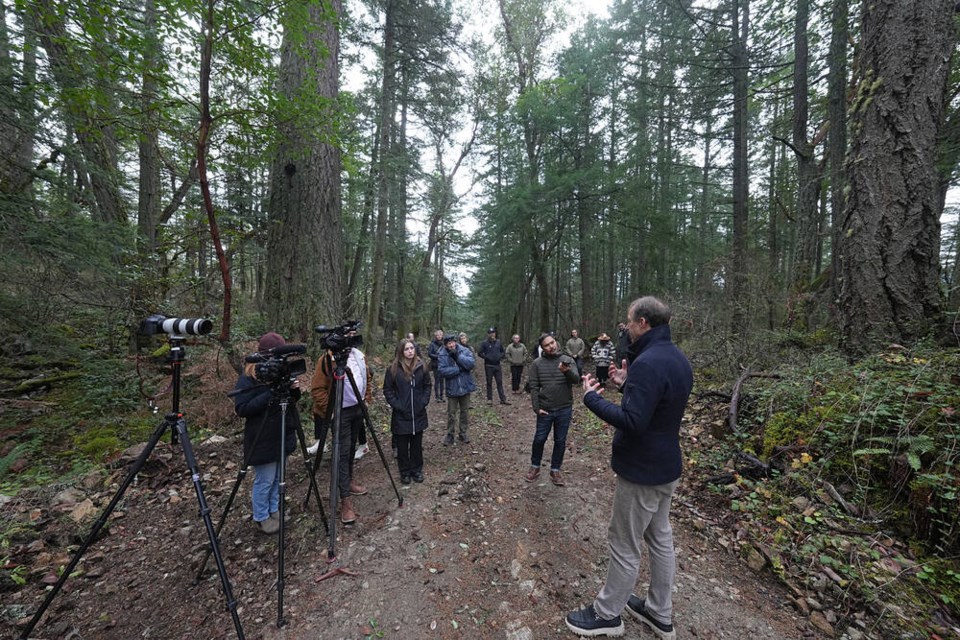Some of the last old-growth stands of Douglas fir and Garry oak on the Peninsula are part of a 15-acre parcel of land added to the border of John Dean Provincial Park on Tuesday, after being acquired by the B.C. Parks Foundation from a private landowner for $1.63 million.
Andy Day, chief executive of the B.C. Parks Foundation, said the addition expands the park on Mount Newton to more than 450 acres.
John Dean was a noted naturalist and former mayor of Rossland who built a cabin in the woods on the Peninsula. He originally donated 80 acres to the province to be preserved as a refuge for people and animals in 1921, making it the first provincial park in Canada donated by an individual.
Dean’s philosophy of preserving natural landscapes for future generations convinced other landowners to follow his lead.
In the late 1950s and early 1960s, landowners including Ruth Woodward, Sydney Pickles and Barret Montford donated a combined 259 acres. About 48 acres of Crown lands were later added, creating the park in its current size.
“The interesting story about this park story is how other property owners over the years stepped up and preserved the land through a series of public and private donations,” said Day. “It shows how individuals can make a lasting difference to people and other species and it highlights the importance of conservation.”
Tsawout First Nations elder Mavis Underwood said Mount Newton — known to the W̱SÁNEĆ First Nations as ȽÁU,WELNEW, meaning “place of refuge” — holds deep cultural and ecological significance.
Underwood tells the story of how, during a great flood, her ancestors survived by anchoring canoes to arbutus trees with cedar rope. As the waters receded, she said, Mount Newton emerged as the first accessible land, giving rise to the W̱SÁNEĆ name, meaning “emerging people.”
During the announcement on Tuesday, Underwood talked about the importance of preserving the land where her father used to hunt and gather.
Funds to acquire the latest 15 acres came from individuals and businesses and larger donors such as the Wilson 5 Foundation, led by Lululemon founder Chip and Summer Wilson, as well as Environment and Climate Change Canada’s Nature Smart Climate Solution Fund.
The Wilsons, in a statement, called old-growth forests “an irreplaceable gift — purifying the air, inspiring movement and grounding us in the beauty of nature.
The Wilson 5 Foundation has provided funds to acquire and preserve land either individually or with partners at Englishman River Estuary and islands in the Salish Sea, including West Ballenas and Saturnina and parts of Lasqueti.
Maureen Dale, president of Friends of John Dean Park Society, which stewards the park, called the addition “a dream realized.”
“John Dean’s vision of a protected sanctuary on Mount Newton is flourishing,” she said.
Members of the society, which was founded in 1984, participate in park-enhancement projects in an agreement with B.C. Parks, including monitoring conditions on the 10 kilometres of trails, reporting problems, guiding nature and history hikes, producing educational material and removing invasive plants.
Dale was the first to see the for-sale sign on the 15-acre parcel last November, and said she “alerted everyone I could think of that this has to be preserved.”
“It had everything we wanted — it butted up against the park and there were no structures on the property. It has a coastal Douglas fir ecosystem, Garry oaks, arbutus, flowering plants.
“And it followed in the tradition of John Dean.”
Dale said the Friends of Dean Park will work with B.C, Parks and W̱SÁNEĆ First Nations to discuss management of the newly protected area and designing new trails. In the meantime, the 15 acres will remain closed to the public to protect it.
Dale said initial work by the society will involve removing invasive plants such as ivy and Scotch broom.
dkloster@timescolonist



